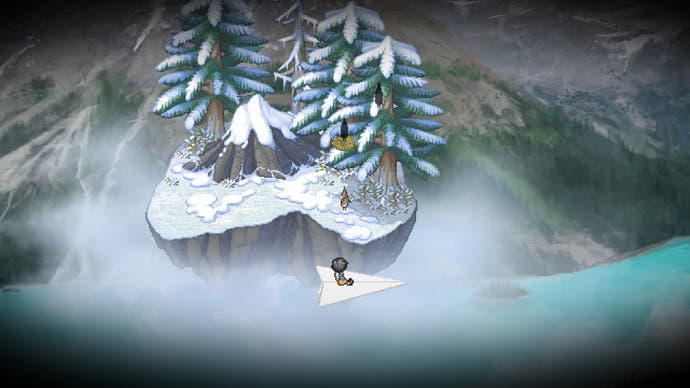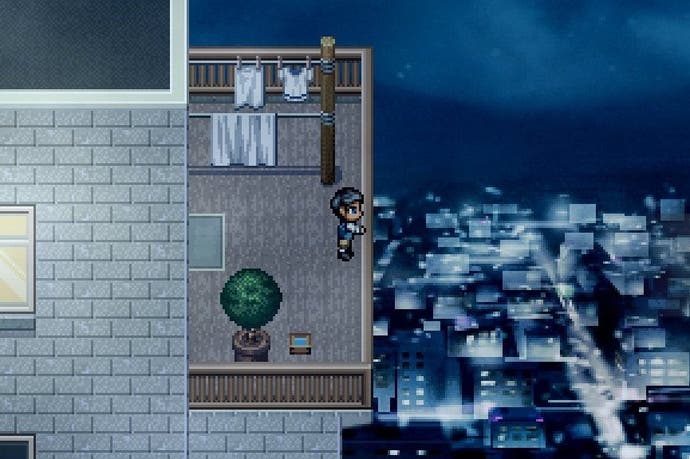A Bird Story review
Tweet dreams.
Sometimes, the school becomes a forest. The lockers become trees and the corridors become pathways, sweetly dappled with moss and puddles and clusters of bright plants. The walk home is transformed from a lonely trudge into a woodland adventure, one that leads from the classroom, with its empty seat right at the back, to the equally empty apartment, with the note on the door from mum or dad, the echoing living room, the bathroom and kitchen both tidy and sterile.
A Bird Story isn't a brilliant piece of work - it's often predictable or trite, and it drags a little despite its 60 minute running time. At its worst it seems to trade genuine feeling for the chilly wiles of technique. But it has brilliance in it, namely this walk home through the forest, and other scattered moments where the whole thing serves to remind you of the pressures and isolation and tempting slides towards fantasy that can be such a big part of childhood. There aren't enough games - or things approaching games - that understand childhood: A Bird Story really seems to. The absent or remote adults, the school that looms too large and lasts too long: designer Kan Gao is not quite this medium's answer to Maurice Sendak, but he occasionally gets close. Occasionally.
Like To the Moon, Gao's follow-up repurposes the aesthetics of a 16-bit RPG in the service of pure storytelling. And, like To the Moon, the results are both heartfelt and manipulative. The story being told this time is considerably simpler than To the Moon's backwards tumble through memory and regret, though. Here, a lonely boy finds a bird with a broken wing. He nurses it back to health. Friendship and gentle surrealism ensue.

It is, perhaps, a little too simple at times, as Gao waits for A Bird Story's central relationship to generate emotion that never quite bubbles forth convincingly. With the quasi-symmetry of the boy and the bird as his focus, maybe Gao's looking in the wrong place. The boy by himself is definitely where A Bird Story is at its strongest - as he wanders through life on his own, drawing at his bedroom desk after school and falling asleep in his chair, jumping to press the elevator call button in his apartment building, navigating a playground in which the other children are just shadows, and furtively checking the coast is clear before bouncing on his parents' bed. Compared to this, and despite a few neatly-handled sequences, the injured bird ultimately feels like a contrivance, a trick to give the narrative a little shape beyond the rituals of a child's life, and to bustle it to an easy conclusion. By extension, the flights of fancy that erupt as the two bond - the cruises in a giant paper plane, a leap of sheer joy from the apartment balcony followed by a Mary Poppins float to earth - seem like misdirection. They suggest Gao is dodging the knotty problems of building a genuine relationship between his characters because A Bird Story's cannot really handle that.
Other choices are problematic, too. A Bird Story is a self-consciously wordless tale, and, when dealing with the human members of the cast, this leads to moments where everything lapses into awkward mime. It's also a tightly-controlled experience, which is stated up-front (the Steam page refers to it as "an interactive pixel animation") and would be absolutely fine if only it was clearer that Gao understood what he wanted from the player's restricted involvement in the first place. The problem isn't the limited instances of control A Bird Story grants, but more that these instances don't feel particularly meaningful. Worse yet, your brain might start to turn this into the game - or a game, anyway. It's a little too easy to spend your time here waiting for the moment where the keyboard icon flashes on screen and you're allowed to shift the boy around a little, moving him, most likely, from one cue to the next. In truth, I'm not entirely sure why the player is allowed even this access, as the experience would work much more neatly without it - and without the staccato rhythm these moments of control impose. Little is earned through such dry interaction. Nothing truly becomes richer through your presence.
And yet beneath the mis-steps and the schmaltz, and beneath the dictatorial heft of the soundtrack - gorgeous and emotive, but laid on a little too heavily throughout - there's still that fascinating glimpse of a boy making the best of a lonely childhood. A boy in search of escape - escape from the empty world he's been granted and, perhaps, from the predictable narrative that's been imposed on it.

